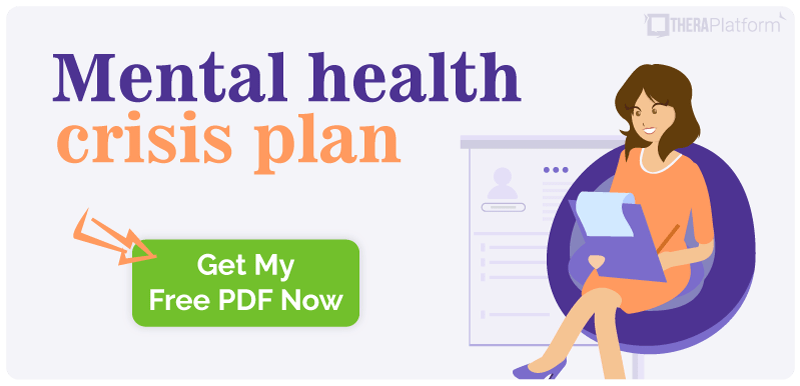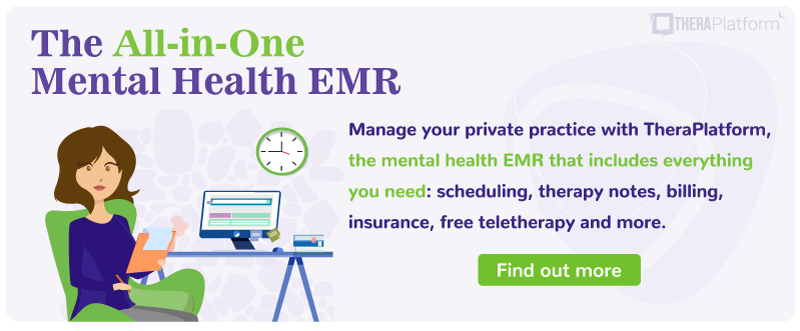Mental health crisis plan

A mental health crisis plan is created to help someone deal with a psychiatric emergency. Ideally, it is a preventative measure rather than a reaction to a previous crisis. It details the steps to take in the event of an emergency where a person may exhibit behavior that harms themselves or others. An effective plan can prevent someone from experiencing severe-and even fatal-consequences.
Who needs to develop a mental health crisis plan?
Not everyone with a mental health problem needs a crisis plan. It is primarily for people who feel like they may become a threat to themselves or others. That being said, it can be difficult to recognize if a client requires one. If they have any history of unstable and dangerous behavior, it may be better to err on the side of caution. To ensure success, it is best created in collaboration with a mental health professional and the client’s support system.
Components of a mental health crisis plan
A mental health crisis has three phases: 1) pre-crisis, 2) escalation, and 3) full-blown emergency. The necessary components of the plan reflect each of these three phases:
Prevention
The hope is that an individual will never need to implement a mental health crisis plan. To meet that goal, the person must practice preventative measures to ensure they remain stable and healthy. These behaviors may include daily exercise, proper sleep hygiene, and regular socializing. A therapist can work with a client to recognize what prevention techniques may be most valuable to a particular person.
Another crucial aspect of prevention is establishing a support network. This is made up of friends, family, and professionals that can assist the person in the case of escalation and emergency. These people are usually close to the individual, both physically and emotionally. They are willing to make the commitment to be educated, involved, and willing to act if a crisis arises.
Triggers
Triggers are something that initiates a crisis. While a trigger is not a guarantee that a crisis will occur, it makes it much more likely. If a client can accurately identify their triggers, they have a much better chance of preventing crisis escalation. Triggers can be almost anything, such as a rupture in a relationship, work stress, or a severe drug reaction. Therapists should explore possible triggers with their clients so they can be prepared when they encounter one.
Early warning signs
These are indicators that an individual may be escalating toward a crisis situation. Similar to triggers, the ability to recognize early warning signs can help a client (and their support system) de-escalate a situation before it becomes an emergency. Warning signs are commonly indicated by a significant worsening of behavior. They may be acute and be marked by an episode of highly unusual or aggressive behavior. Or, they may occur over days and weeks. More gradual signs may include withdrawal from people and activities, decreased work/school performance, and a deterioration in hygiene.
Coping techniques
Coping techniques can be instituted for both sudden and more gradual declines in behavior. For a more moderate decline, coping skills may be similar to what you do to prevent crises from developing in the first place. For example, friends and family that are familiar with your mental health crisis plan may inform your therapist or encourage you to start exercising with them. More sudden escalations require shorter-term coping techniques, such as deep breathing, distraction, or taking a walk around the block.
Crisis intervention
The last component of a mental health crisis plan is what to do when a client is in a full-blown crisis. This means they are actively in danger of causing harm to themselves or others.
People in this phase are usually past the point where coping techniques will have much effect. Instead, interventions are aimed at keeping the individual and other people safe. If available, people in the individual’s support group may have to take control of the situation because the client is not in a healthy mental state.
Moments of crisis are very stressful for everyone involved. As such, interventions need to be easy to access and implement. Crisis interventions may include contacting crisis text lines, therapist emergency numbers, and 911. For high-risk cases, a Psychiatric Advance Directive (PAD) can be set up beforehand, which allows a trusted person to legally act on behalf of the client in case of emergency. A PAD details the services another person may authorize if the person in crisis is unable to make coherent choices.
Tips for managing a mental health crisis plan
- Always create a mental health crisis plan at a time of relative calm. Both client and therapist need to be objective and realistic if it is going to be effective.
- The plan should be frequently reviewed and updated to incorporate new information. Plus, if you don’t go over the plan regularly, the client (and their support system) won’t know what to do in a time of crisis.
- Practice coping techniques. A person will not be able to perform a coping skill in a time of crisis if they are not highly familiar with it. Also, if someone is acting psychotic, suicidal, or homicidal, it is likely too late to try and use coping strategies.
- All relevant information should be easily accessed. For example, the mental health crisis plan needs to be written down and simple to find. A list of emergency contacts should be at the client’s fingertips.
- Besides emergency contacts, quick resources for crisis intervention should be included. For example, they can call the Suicide & Crisis Lifeline at 988 or text “HOME” to the Crisis Text Line at 741741.
- Prepare a crisis information sheet to give to caregivers. The information may include medical and mental health history, therapist contact info, diagnosis (if any), and current medications. A person’s ability to provide relevant information during a crisis is significantly reduced. This sheet may be the only information available.
- Have clients sign a release of information form that will allow you (and other helping professionals) to give relevant information to crisis workers during emergencies. This will alleviate any ethical dilemmas you may have with sharing confidential knowledge.
- Mental Health America has a simple yet effective template illustrating a mental health crisis plan.
Mental health crisis plans are a critical piece to managing psychiatric emergencies. But creating a plan can be challenging and time-consuming. Theraplatform is here to help. It has a library of templates that make it easy to create the type of plan you require. Additionally, you can build plans from scratch to suit your specific needs.
Start 30-day Free Trial and explore TheraPlatform. HIPAA Compliant Video and Practice Management Software for Therapists.
Theraplatform, an all-in-one EHR, practice management tool built specifically for therapists, is more than just a great place to generate electronic health records (EHR). Start a 30-day free trial today with no credit card required. Cancel anytime.
More resources
- Therapy resources and worksheets
- Therapy private practice courses
- Ultimate teletherapy ebook
- The Ultimate Insurance Billing Guide for Therapists
- The Ultimate Guide to Starting a Private Therapy Practice
Free video classes
- Free mini video lessons to enhance your private practice
- 9 Admin tasks to automate in your private practice
Disclaimer: This information does not serve as legal or tax advice. It is only for informational purposes and should serve as a guide to assist you as you work through the decision-making process. You should consult with an attorney and tax advisor for legal and tax advice.





